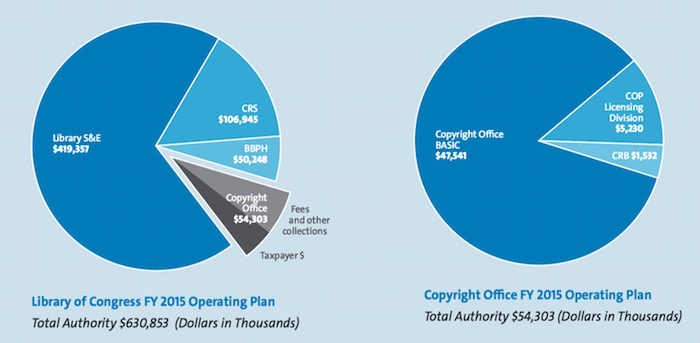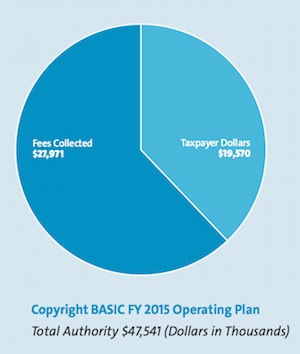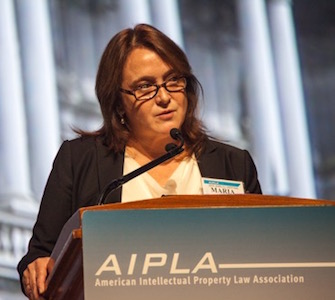On Friday, October 23, 2015, the Copyright Office released a public draft of the Copyright Office’s Strategic Plan, setting forth the Office’s performance objectives for the next five years.
Maria Pallante has been the United States Register of Copyrights since assuming her duties on June 1, 2011. As Register of Copyrights Pallante directs the legal, policy, and business activities of the United States Copyright Office. As Register she is also the principle advisors to the Congress on matters of domestic and international copyright policy.
Perhaps fortuitously, Pallante was the scheduled luncheon speaker later in the day at the annual meeting of the American Intellectual Property Law Association (AIPLA).
“We should have annual appropriated dollars,” said Pallante. “We want people to participate and to have as robust a system for accurate data as possible because the return on the economy and for culture and commerce is tremendous, so for me it is something like roads and bridges. It is an infrastructure question for a system that is important to the U.S. government, so some appropriations is necessary, certainly more than we get now.”
Funding the Copyright Office was a theme throughout Pallante’s speech at AIPLA, and also in the Strategic Plan. “There is no question that investments are necessary to meet the strategic goals,” the Strategic Plan reads. “Funding should reflect a strong commitment to both human capital and capital projects, and ensure that the Office is interoperable with, and supportive of, the data, technologies, and businesses of its customer base.”
According to the Strategic Plan, funding for the Copyright Office should come from two distinct sources: (1) “Fees paid by authors, corporate entities, and other customers” and (2) “appropriated dollars that reflect the value of Copyright Office services to entrepreneurs, the public, and the economy.”
Presently, very little funding for the Copyright Office comes from annual appropriations, which is a problem given the desire to revamp and update the Copyright Office systems. Much of Pallante’s speech at AIPLA was directed toward explaining Copyright Office funding and calling for greater appropriations support from Congress.

From the Copyright Office Strategic Plan, showing just how small a portion of the Library of Congress budget is devoted to the Copyright Office.
“We need policies for Copyright Office investment systems and acquisition processes that are dedicated to the Copyright Office and not other parts of the Library [of Congress],” Pallante explained to the AIPLA audience. “We need to be able to submit appropriations requests and operating plans directly to Congress not through the Library, we need to adopt flexible fee schedules that allow for the recovery of aggregate costs and certain capital costs… and we need the ability to spend fee receipts across annual appropriations without regard to a spending cap.”
Those familiar with how the budget operates for the United States Patent and Trademark Office will likely feel great empathy for the Copyright Office, which usually doesn’t have enough money to do all the work statutorily required.

Despite being a repository for works of cultural significance, the Copyright Office gets little taxpayer support.
“We are asked to estimate the amount of fees we think we will get in a given year,” Pallante explained. “If we hit that cap early we can wind up with work to do… and no ability to use the money sitting in our account. And then we get into an issue whether and how we will be able to keep the money sitting in our account through the next appropriated year. That is no way to treat fees that people are paying into the Copyright system… we should be able to put those fees right back into the system.”
At the end of her speech Pallante mentioned that she had just received a letter from the Senate Judiciary Committee, specifically sent by Senator Chuck Grassley (R-IA), who Chairs the Committee, and Ranking Member Senator Patrick Leahy (D-VT). The letter from Grassley and Leahy asked the Copyright Office to undertake a study and to report back on a number of software copyright issues.
Pallante read a portion of the letter received from the Senate Judiciary Committee, which said: “As software plays an ever increasing role in defining consumer interactions with devices and products, many questions are being asked about how consumers can lawfully use products that rely on software to function.” She then remarked that this inquiry goes away from copyrights merely protecting expressive content, and further pointed out that the Senate is asking about works that are protected by copyright but still functional.
Ultimately, there will be a Federal Register Notice to announce the software copyright investigation. Pallante previewed the questions that the Copyright Office will be putting to the public, which likely won’t appear in the Federal Register until sometime in December 2015. Some of the questions will be:
- Please address the provisions of the Copyright law that are implicated by the ubiquity of copyrighted software in everyday products.
- Whether and to what extent the design, distribution and legitimate use of products are being enable and/or frustrated by the application of existing copyright law to software in everyday products.
- Whether and to what extent innovative services are being enabled and/or frustrated by the application of copyright law to software in everyday products.
- Whether and to what extent legitimate interests or business models for copyright owners and users could be undermined or improved by changes to copyright laws in this area.
- Identify key issues in how the copyright law intersects with other areas of law and establishing how products that rely on software to function can be used.
Pallante explained that this is not an exhaustive list of questions, and that the Copyright Office will need to delivered the report to the Senate Judiciary Committee no later than the end of 2016.

![[IPWatchdog Logo]](https://ipwatchdog.com/wp-content/themes/IPWatchdog%20-%202023/assets/images/temp/logo-small@2x.png)


![[Advertisement]](https://ipwatchdog.com/wp-content/uploads/2024/04/Patent-Litigation-Masters-2024-sidebar-early-bird-ends-Apr-21-last-chance-700x500-1.jpg)

![[Advertisement]](https://ipwatchdog.com/wp-content/uploads/2021/12/WEBINAR-336-x-280-px.png)
![[Advertisement]](https://ipwatchdog.com/wp-content/uploads/2021/12/2021-Patent-Practice-on-Demand-recorded-Feb-2021-336-x-280.jpg)
![[Advertisement]](https://ipwatchdog.com/wp-content/uploads/2021/12/Ad-4-The-Invent-Patent-System™.png)







Join the Discussion
5 comments so far.
Anon
October 27, 2015 09:38 amI think that such an article would be a great idea – and perhaps even better would be to have the piece published in the typical “copyright is enough” software forums.
David Stein
October 26, 2015 05:15 pm@Gene: Yes, absolutely! I’ll contact you offline with some thoughts.
Gene Quinn
October 26, 2015 04:29 pmDavid-
Would you have any interest in expanding your second point about patent law into an article for publication here on IPWatchdog.com? Perhaps we could co-author if you prefer?
In my back and forth with Mark Cuban recently he seemed to have no clue about just how limited software copyright protection is. He even asked if there weren’t reverse engineering prohibitions under the Copyright Act. There is widespread misunderstanding.
-Gene
David Stein
October 26, 2015 03:15 pmI’m hoping that the “other areas of law” that Ms. Pallante investigates include:
(1) Antitrust law, specifically regarding consumable components.
Configuring printers to only use authorized cartridges (at a huge markup), and configuring Keurig coffee makers to only use authorized coffee pods, are reminiscent of International Salt v. U.S. – and are certainly not the type of activities that the DMCA was intended to protect.
(2) Patent law.
A long-standing plank of the anti-software-patent movement is the claim that software is adequately covered by copyright. And yet, many parties decry the result in Oracle v. Google – because the copyrighted aspect of the Java SDK was functional, and therefore should not be subject to copyright. These advocacy groups are playing this shell game with the objective of making intellectual property protection a mirage: theoretically available, but not practically attainable and enforceable.
This discrepancy needs to be addressed once and for all, with a clear rule that distinguishes software based on the fundamental purposes of copyright and patents. Specifically:
Aspects of software that are functional are strongly protected by patent, and not protected by copyright.
Aspects of software that are expressive are strongly protected by copyright, and are not protected by patent.
nat scientist
October 25, 2015 12:14 pmRespectfully, the Registrar, as titled under Maria Pallante’s photo is of course the Register. Where is she going with this, hardcover software or softcover hardware?